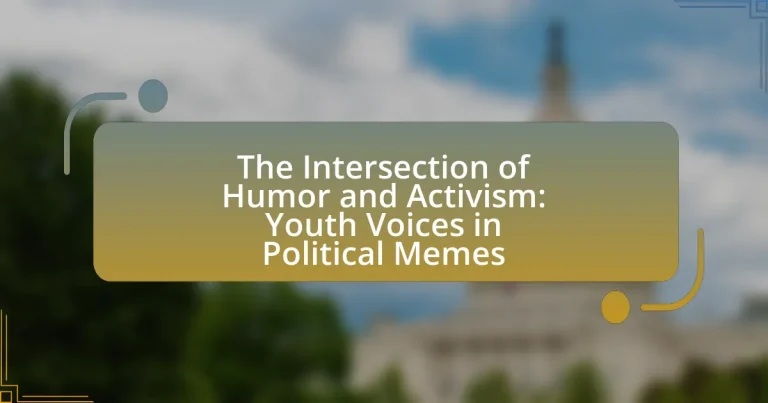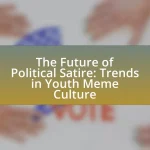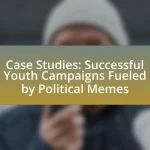The article explores the intersection of humor and activism through the lens of political memes, emphasizing their role in engaging audiences and conveying critical social messages. It highlights how humor simplifies complex political issues, making them more accessible, particularly to younger demographics who are active on social media. The piece discusses the significance of youth voices in this context, showcasing how young activists utilize satire and relatable content to mobilize support for social movements. Additionally, it examines the effectiveness of memes in fostering political discourse, raising awareness, and encouraging civic engagement, while also addressing potential drawbacks and best practices for creating impactful political memes.
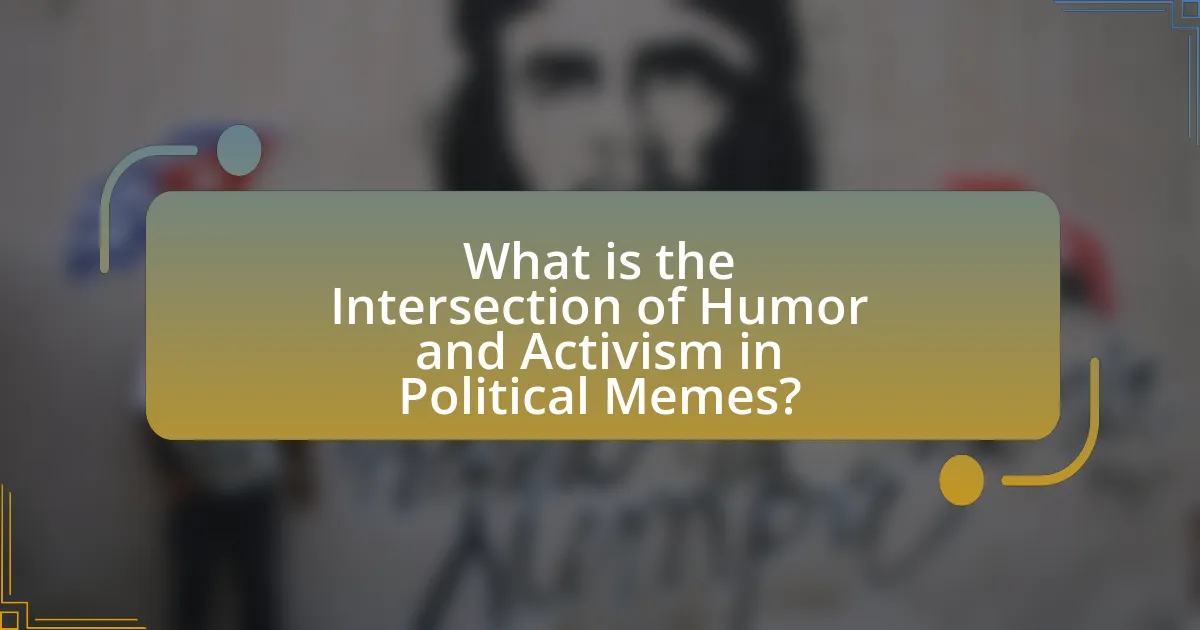
What is the Intersection of Humor and Activism in Political Memes?
The intersection of humor and activism in political memes lies in their ability to engage audiences while conveying critical social and political messages. Political memes utilize humor to simplify complex issues, making them more accessible and shareable, particularly among younger demographics. Research indicates that humor can enhance the persuasive power of political messages, as seen in studies like “The Role of Humor in Political Communication” by Jeffrey M. Berry and Sarah Sobieraj, which highlights how humor can foster political engagement and mobilization. By combining entertainment with activism, political memes effectively raise awareness and encourage discourse on pressing societal issues.
How do humor and activism converge in the context of political memes?
Humor and activism converge in the context of political memes by using satire and wit to engage audiences and promote social change. Political memes often simplify complex issues, making them more accessible and relatable, which can mobilize younger demographics who are typically more engaged with digital content. For instance, memes that mock political figures or highlight social injustices can spread rapidly on social media platforms, amplifying activist messages and fostering community among like-minded individuals. Research indicates that humor can lower resistance to difficult topics, making audiences more receptive to activism, as seen in campaigns like the “Ice Bucket Challenge,” which utilized humor to raise awareness for ALS.
What role does satire play in political memes?
Satire serves as a critical tool in political memes by enabling the expression of dissent and critique against political figures and policies. Through humor and exaggeration, satire simplifies complex political issues, making them more accessible and engaging for a broader audience. For instance, a study by the Pew Research Center found that 55% of young adults engage with political content through memes, highlighting their effectiveness in shaping political discourse. This engagement often leads to increased awareness and mobilization around social and political issues, demonstrating the significant impact of satire in fostering activism among youth.
How does humor enhance the message of activism?
Humor enhances the message of activism by making complex social issues more relatable and engaging for audiences. When activists use humor, they can break down barriers, reduce resistance, and foster a sense of community among supporters. For example, political memes often employ satire to critique societal norms, making the message more digestible and shareable, which can lead to increased awareness and mobilization. Research indicates that humor can improve retention of information, as seen in studies where humorous content led to higher recall rates among participants. This effectiveness in communication is crucial in activism, where capturing attention and inspiring action are essential.
Why are youth voices significant in this intersection?
Youth voices are significant in the intersection of humor and activism because they bring fresh perspectives and innovative approaches to political discourse. Their engagement through political memes allows for the dissemination of complex ideas in a relatable and accessible manner, often resonating with a broader audience. Research indicates that young people are more likely to utilize social media platforms for activism, with 70% of youth reporting that they have engaged in political discussions online, thus amplifying their voices and influencing public opinion. This unique blend of humor and activism not only fosters community engagement but also encourages critical thinking and dialogue around pressing social issues.
What unique perspectives do young activists bring to political memes?
Young activists bring fresh, innovative perspectives to political memes by integrating humor with social justice themes, making complex issues more relatable and engaging. Their unique understanding of digital culture allows them to craft memes that resonate with their peers, often using irony and satire to critique political systems and highlight injustices. For instance, a study by the Pew Research Center in 2021 found that 70% of young people believe social media is an effective tool for activism, demonstrating their commitment to using humor as a means of mobilization and awareness. This approach not only fosters community but also encourages dialogue around pressing societal issues, amplifying their voices in the political landscape.
How does the digital landscape empower youth voices in activism?
The digital landscape empowers youth voices in activism by providing accessible platforms for expression and mobilization. Social media, blogs, and online forums enable young activists to share their perspectives, organize events, and engage with a global audience. For instance, movements like #BlackLivesMatter and #FridaysForFuture gained momentum through digital channels, allowing youth to amplify their messages and connect with like-minded individuals. Research indicates that 70% of young people believe social media is an effective tool for activism, highlighting its role in shaping public discourse and influencing change.
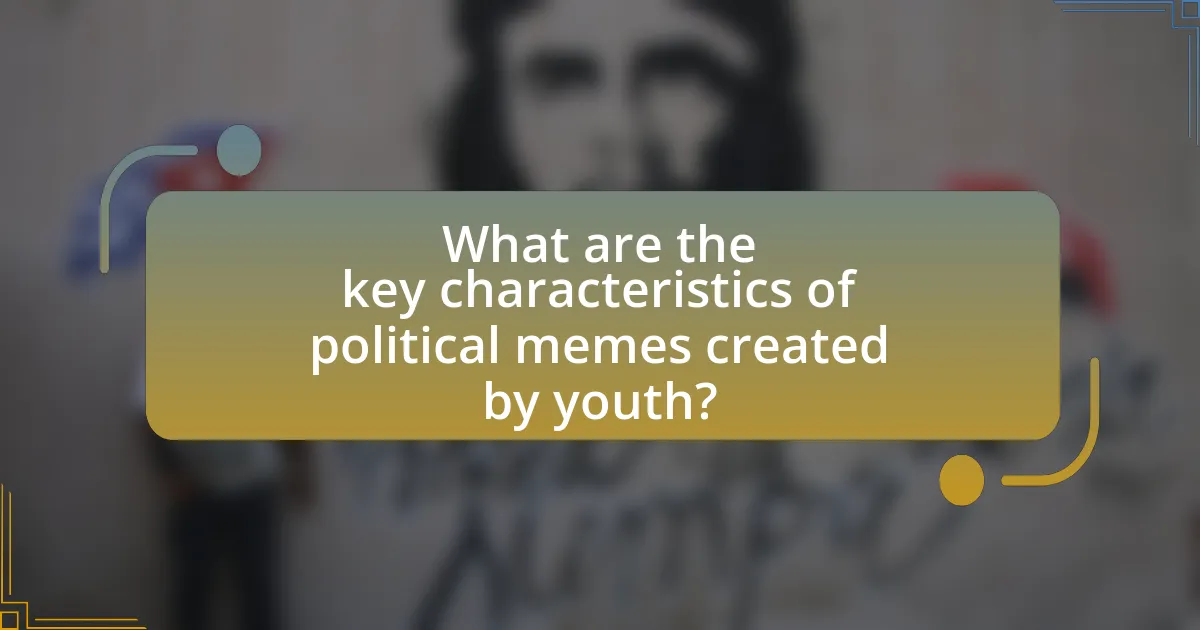
What are the key characteristics of political memes created by youth?
Political memes created by youth are characterized by their humor, relatability, and engagement with current social issues. These memes often utilize satire and irony to critique political figures or policies, making complex topics more accessible and engaging for their peers. Additionally, youth-generated political memes frequently incorporate popular culture references, which resonate with their audience and enhance the shareability of the content. Research indicates that these memes serve as a form of digital activism, allowing young people to express their political opinions and mobilize others through social media platforms. For example, a study by the Pew Research Center found that 55% of teens engage with political content online, highlighting the significant role of memes in shaping political discourse among youth.
How do these memes reflect current political issues?
Memes reflect current political issues by serving as a medium for youth to express their opinions and critique societal norms. They often encapsulate complex political sentiments in a humorous format, making them more accessible and shareable among younger audiences. For instance, memes addressing climate change, social justice, and political corruption resonate with youth activism, as seen in the widespread use of memes during movements like Black Lives Matter and climate strikes. These memes not only highlight pressing issues but also mobilize collective action, as evidenced by the viral nature of content that encourages political engagement and awareness.
What themes are commonly addressed in youth-created political memes?
Youth-created political memes commonly address themes such as social justice, climate change, political corruption, and activism. These themes reflect the concerns and priorities of younger generations, often using humor and satire to engage audiences. For instance, memes about climate change frequently highlight the urgency of environmental issues, while those focusing on social justice often critique systemic inequalities and advocate for marginalized communities. Research indicates that humor in political memes can enhance message retention and encourage civic engagement among youth, making these themes particularly impactful in the digital landscape.
How do visual elements contribute to the effectiveness of these memes?
Visual elements significantly enhance the effectiveness of political memes by capturing attention and conveying messages quickly. Memes often utilize striking images, bold colors, and relatable characters to evoke emotional responses, making complex political issues more accessible. For instance, a study by Shifman (2014) highlights that visual humor can simplify intricate topics, allowing for easier understanding and engagement among youth audiences. This combination of visual appeal and humor fosters shareability, increasing the reach and impact of the memes in political discourse.
What platforms are most popular for sharing political memes among youth?
Social media platforms such as Instagram, TikTok, and Twitter are the most popular for sharing political memes among youth. These platforms facilitate rapid dissemination of content, allowing users to engage with political issues through humor and creativity. According to a 2021 study by the Pew Research Center, 69% of U.S. teens reported using Instagram, while 60% use TikTok, making these platforms key venues for youth political expression. Additionally, Twitter’s real-time nature supports the viral spread of memes, further enhancing its role in political discourse among younger demographics.
How does the choice of platform influence the reach of political memes?
The choice of platform significantly influences the reach of political memes by determining the audience demographics, engagement levels, and sharing capabilities. Different platforms, such as Twitter, Instagram, and Facebook, cater to varying user bases; for instance, Twitter’s character limit encourages concise, impactful messaging, while Instagram’s visual focus allows for more creative expression. Research indicates that memes shared on platforms with higher user engagement, like Instagram, tend to achieve greater virality, as users are more likely to share visually appealing content. Additionally, algorithms on these platforms prioritize content that generates interaction, further amplifying the reach of political memes that resonate with users.
What role do social media algorithms play in meme visibility?
Social media algorithms significantly influence meme visibility by determining which content is prioritized in users’ feeds. These algorithms analyze user engagement metrics, such as likes, shares, and comments, to promote memes that resonate with specific audiences. For instance, a study by the Pew Research Center found that 64% of social media users are more likely to see content that aligns with their interests, which directly affects the reach of political memes among youth. Consequently, memes that generate higher engagement are more likely to be circulated, amplifying their visibility and impact in political discourse.
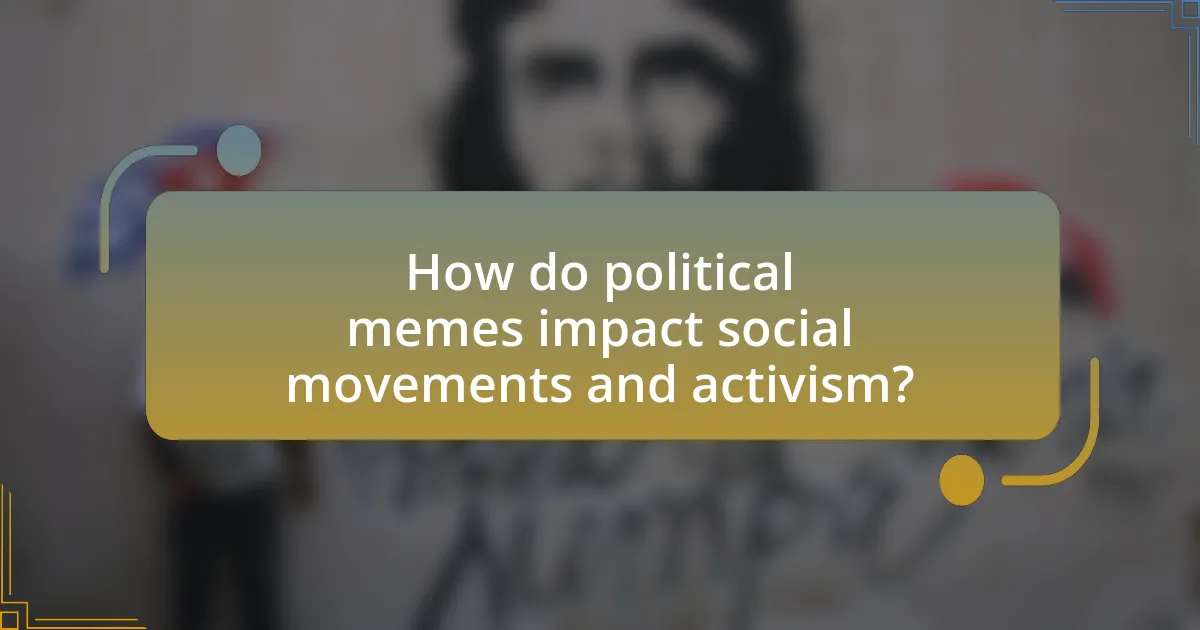
How do political memes impact social movements and activism?
Political memes significantly influence social movements and activism by facilitating rapid information dissemination and fostering community engagement. These memes often simplify complex political issues into relatable and shareable content, making them accessible to a broader audience. For instance, during the Arab Spring, memes played a crucial role in mobilizing youth and spreading awareness about protests, demonstrating their effectiveness in galvanizing support for social change. Research indicates that memes can enhance political participation by creating a sense of belonging among users, as seen in movements like Black Lives Matter, where memes have been used to highlight injustices and rally support.
What evidence exists to show the effectiveness of memes in activism?
Memes have proven effective in activism by increasing engagement and spreading awareness rapidly among youth. Research conducted by the Pew Research Center indicates that 55% of young adults have shared political memes, demonstrating their role in shaping political discourse. Additionally, a study published in the journal “Social Media + Society” by authors Sarah J. Jackson and M. J. Lee found that memes can simplify complex political issues, making them more accessible and relatable, thus enhancing their persuasive power. These findings illustrate that memes not only capture attention but also facilitate discussions around social and political issues, amplifying activist messages.
How do memes mobilize youth participation in social movements?
Memes mobilize youth participation in social movements by simplifying complex issues into relatable and shareable content that resonates with young audiences. This visual and humorous format captures attention quickly, making it easier for youth to engage with social and political topics. For instance, during the Black Lives Matter movement, memes effectively communicated messages about racial injustice, leading to increased awareness and participation among young people. Research indicates that 55% of young people reported being influenced by memes to take action on social issues, highlighting their role as catalysts for mobilization.
What are the potential drawbacks of using humor in activism?
Using humor in activism can lead to misunderstandings and trivialization of serious issues. When humor is employed, it may cause audiences to perceive the activism as less serious, potentially undermining the urgency of the cause. For instance, a study published in the journal “Political Psychology” found that humor can sometimes alienate individuals who do not share the same cultural references or sense of humor, thereby limiting the reach and effectiveness of the message. Additionally, humor can be misinterpreted, leading to backlash or offense, which can detract from the intended message and harm the credibility of the activists involved.
How can activists leverage humor in their campaigns?
Activists can leverage humor in their campaigns by creating relatable and engaging content that resonates with their audience, making complex issues more accessible. Humor can simplify difficult topics, encourage sharing on social media, and foster a sense of community among supporters. For instance, political memes often use satire to highlight social injustices, effectively capturing attention and prompting discussions. Research shows that humor can enhance message retention and increase the likelihood of audience engagement, as seen in campaigns like the “Ice Bucket Challenge,” which combined humor with a serious cause to raise awareness and funds for ALS.
What strategies can be employed to create impactful political memes?
To create impactful political memes, one effective strategy is to leverage humor while addressing relevant social issues. Humor can engage audiences and make complex political topics more accessible, as evidenced by studies showing that humorous content is more likely to be shared on social media platforms. Additionally, using relatable imagery and concise text enhances the meme’s clarity and emotional resonance, which can drive engagement and discussion. Research indicates that memes that evoke strong emotional responses, such as laughter or outrage, are more likely to go viral, thereby amplifying their political message.
How can activists ensure their humor resonates with diverse audiences?
Activists can ensure their humor resonates with diverse audiences by incorporating culturally relevant references and understanding the values and experiences of different demographic groups. This approach allows humor to be inclusive and relatable, fostering a sense of connection among varied audiences. Research indicates that humor that reflects the cultural context of the audience is more likely to be appreciated; for example, a study published in the Journal of Communication found that humor tailored to specific cultural norms enhances engagement and relatability. By actively seeking feedback from diverse groups and adapting their humor accordingly, activists can create content that resonates widely and effectively promotes their message.
What best practices should youth consider when creating political memes?
Youth should prioritize clarity, relevance, and ethical considerations when creating political memes. Clarity ensures that the message is easily understood, which is crucial for effective communication in a medium that often relies on quick consumption. Relevance involves connecting the meme to current political events or issues that resonate with the target audience, enhancing engagement and impact. Ethical considerations include avoiding misinformation, respecting individuals’ rights, and being mindful of the potential consequences of the meme’s message. For instance, a study by the Pew Research Center found that 55% of young people engage with political content online, highlighting the importance of responsible meme creation to foster informed discussions rather than perpetuating false narratives.
